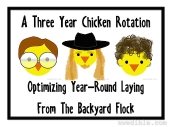posted 11 years ago
Hello, this is my first post on this forum, so I hope I don't commit any faux pas. I reside on a small farm in Norway, and it goes without saying that we're very inspired by permaculture - that's why I'm here.
We have 7 chickens: one rooster and the rest are hens. We originally had three hens and one rooster (all siblings, thus the same size), but wanted to expand, and were given three new hens and another rooster (for good genetics). The old rooster was then turned into coq au vin, and we started observing trouble in our chicken coop. Two of the new hens are a slightly smaller breed (Norwegian Jærhøns), and they get chased and picked on all the time. We were told to expect this in the beginning, but the problem prevailed and now we're getting frustrated that they won't just stop. The bigger chickens have a clear agenda of being nasty to the small ones - there are two feeders and plenty of room for them (they're inside only now, outside it's snowy and cold), so they could easily eat apart from each other or even in turns. Yet the big ones seek out the small ones without it being feeder related (or so it seems), and they're just being real bastards to be honest.
Having read about the problem, I have had suggestions that it could be a room issue, but they have lots of space and plenty of obstacles and such, even some veggies hanging around for them to pick at. Then there's the pecking order, but if that were the case the big ones would eat first, then allow the small ones to eat. Now they aren't even allowed on the floor of the coop. Today I tried another thing, which is to isolate them (plenty of people advise as to doing this at once when the new ones arrive). The old ones that are nasty are now in a confined area at the back of the coop (with the bare essentials) and I've put a feeder on each side of the fence so they can "eat together". I'm hoping this isn't just a shot in the dark.
Anyway, do you have any ideas? All suggestions would be greatly appreciated - it's really causing a headache that the birds can't just be friends. Their lives seem so plentiful - space to play around, a pit of sand to bathe in, lots of clean bedding (going for a deep litter situation), plenty of brooder boxes, organic feed in abundance, supplemented with fruit and veg of all sorts, yet they complain. It isn't only in diet that they have a lot in common with humans...









